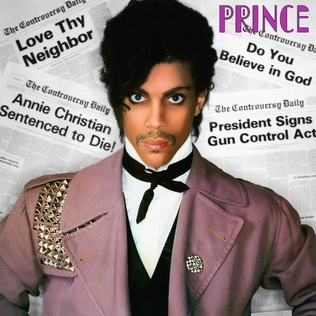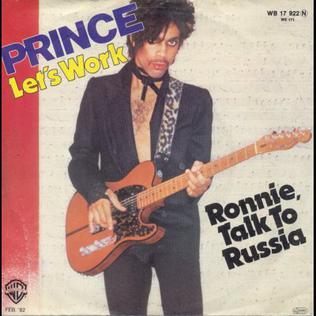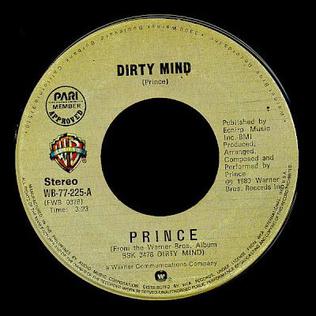
Controversy is the fourth studio album by American recording artist Prince, released on October 14, 1981 by Warner Bros. Records. It was produced by Prince, written by him, and he also performed most of the instruments on its recording.

Around the World in a Day is the seventh studio album by American recording artist Prince, and the second release where his backing band The Revolution is billed. It was released on April 22, 1985, by Paisley Park Records and Warner Bros. Records. Departing somewhat from the commercial sound of his previous release, the massively successful Purple Rain (1984), the album instead saw Prince experimenting with psychedelic styles and more opulent textures. In compliance with Prince's wishes, the record company released the album with minimal publicity, withholding accompanying singles until almost a month after the album's release.

The Time is the 1981 debut album by the Time. The album was largely produced and arranged by Prince, credited as Jamie Starr. Three singles came from the album: "Get It Up", "Cool" and "Girl", with the first two charting within the top ten on the R&B charts.

What Time Is It? is a 1982 album by the Time. The album was recorded at Sunset Sound and Prince's home studio in the Minneapolis suburbs. The title of the album comes from an exclamation by Morris Day that became associated with the band's on-stage theatrics, appearing frequently on the band's debut album as well.

Ice Cream Castle is a 1984 album by The Time. Similar to their previous two albums, this album consists of six tracks in the funk-pop or ballad genre, and it was produced and arranged by Prince as "The Starr ★ Company".

"Controversy" is a song by American musician Prince, the lead single and title track to his 1981 album. The song addresses speculation about Prince at the time such as his sexuality, gender, religion, and racial background, and how he could not understand the curiosity surrounding him.

"New Power Generation", or "N.P.G.", is a song by American musician Prince from the 1990 album and film Graffiti Bridge. It is an anthem for his backing band, The New Power Generation, who were officially co-credited on his album covers for a time, and continued to back him up until 2013, albeit with a changing lineup. The song saw minimal chart attention, and was not as successful as its predecessor, "Thieves in the Temple".

"Uptown" is the lead single from Prince's third album, Dirty Mind. Beginning with a lone drum intro, the track explodes into the keyboards of the chorus. The verses feature a more prominent funk guitar. The song breaks down to a more instrumental section toward the end that mainly consists of guitar, bass and drums with an occasional keyboard riff. The minimalist style of the song is representative of most of the Dirty Mind album. The song addresses the Uptown neighborhood of Minneapolis that was the city's hang-out spot for artists.

"Let's Work" was the second single from the 1981 album Controversy, by Prince. The song originates from a dance called "the Rock" that local kids were doing at the time in Minneapolis. Prince responded quickly with a track called "Let's Rock", and wished to quickly release it as a single. Warner Bros. refused, and a disappointed Prince did not include the song on Controversy, saying the phase had passed. Instead, the song was updated with new lyrics and possibly new music and became "Let's Work"—one of his most popular dance numbers.

"Why You Wanna Treat Me So Bad?" is the US follow-up single to Prince's first big hit, "I Wanna Be Your Lover". It is also Prince's first rock and roll-inspired single release. It did not make the top 40 of the Billboard Hot 100 charts, although it did reach #13 on the R&B Singles charts. The lyrics explore a relationship with a cruel lover. The song prominently features guitar and bass, with the keyboard featured in a less prominent role. A highlight of the song is a soaring guitar solo at the end, played by Prince himself.

"Dirty Mind" is the follow-up single in the U.S., and title track to Prince's third album, released in 1980. The song is built around a keyboard riff created by Doctor Fink, which dominates the song. The demo-like song lacks a chorus, and is a stark departure of the smooth R&B sound of Prince's first two albums. The lyrics concern sexual thoughts, which are fairly representative of the other songs from the album. The single's B-side is the ballad "When We're Dancing Close and Slow", from the previous year's Prince. "Dirty Mind" reached number sixty-five on the soul chart. Along with the tracks "Uptown" and "Head", "Dirty Mind" reached number five on the dance chart.

"Gotta Stop (Messin' About)" was the follow-up single in the UK to support Prince's third album, Dirty Mind. The single was not an album track, though it was written at the same time, and possessed a similar sound. "Gotta Stop Messin' About" marked the first time Prince released non-album tracks, which, especially as B-sides, would become a prominent part of his career.

"Do It All Night" was the lead single in the UK to support Prince's third album, Dirty Mind. The song is an ode to sex, and Prince exclaims that he wants to do it all night. The song opens with a simple keyboard hook before a prominent bass guitar kicks in, along with rhythm guitar and live drums. The song consists of two verses and several repeats of the chorus. Also featured is a keyboard solo in the bridge. The song opened Prince's Dirty Mind tour. The B-side of the track was the controversial Dirty Mind ode to oral sex, "Head".
"When You Were Mine" is a song written and released by Prince on his 1980 album, Dirty Mind. Though not released as a single, the song received a promotional 12" release. "When You Were Mine" was later the B-side for Prince's "Controversy" single in 1981.

"Cool" is a song by The Time, released as the second single from their eponymous debut album. Like most of the album, the song was recorded in Prince's home studio in April 1981, and was produced, arranged, and performed by Prince with Morris Day later adding his lead vocals. The song was co-written with Revolution guitarist Dez Dickerson and contains background vocals by keyboardist Lisa Coleman, however both were uncredited.

"Get It Up" is the debut single by the Time, from their 1981 self-titled debut album. Like most of the album, the song was recorded in Prince's home studio in April 1981, and was produced, arranged, composed and performed by Prince with Morris Day later adding his lead vocals. Revolution keyboardist Doctor Fink provided synth solos on the track, uncredited.
"Computer Blue" is a song by Prince and The Revolution. Released on June 25, 1984, it is the fourth track on Prince's sixth album, Purple Rain, which also served as the soundtrack to the film of the same name. In the film, the song represents Prince's character's angst at the budding relationship between the characters played by Morris Day and Apollonia, the latter of whom he desires, and he performs it in front of the two during The Revolution's set at a nightclub with the aim of upsetting them. The song was composed by Prince with credit to his father, John L. Nelson, for the guitar solo based on a piano instrumental written by Nelson and Prince. He titled the instrumental piece "Father's Song" and recorded it on piano for the film, though onscreen it was portrayed as being played by Prince's character's father, played by Clarence Williams III. On the box-set Purple Rain Deluxe (2017), a different and longer recording of "Father's Song" was included.
"Baby I'm a Star" is a song written and recorded by American musician Prince from his album Purple Rain. It is also the B-side on the "Take Me with U" single.
"International Lover" is a song by American musician Prince from the album 1999. It was the song for which he received his first Grammy Award nomination.
"Partyup" is a song performed by Prince on his 1980 album, Dirty Mind. It was based on a groove that had been created by his friend Morris Day, who would eventually become the lead singer of The Time. Though not released as a single, the song did receive popularity in disco clubs and subsequently reached #5 on the Billboard Dance/Disco Top 100 chart.















